Business Law Report: Analysis of UK Business Law, Cases, and Impacts
VerifiedAdded on 2021/02/21
|15
|4804
|449
Report
AI Summary
This report provides a comprehensive overview of UK business law, beginning with an examination of the nature of the legal system, including the sovereignty of the UK Parliament and the sources of UK law, such as Acts of Parliament, Common Law, European Union Law, and the European Convention on Human Rights. It explores the roles of the government in law-making and the application of statutory and common law within the Justice Court. The report then delves into the impact of different types of laws, including employment law, contract law, and company law, on business organizations. Furthermore, the report analyzes various types of businesses and their legal commencement, contrasting incorporated and unincorporated business structures, and comparing the advantages and disadvantages of companies versus partnerships. The report concludes with case studies and a detailed analysis of the legal concepts discussed.
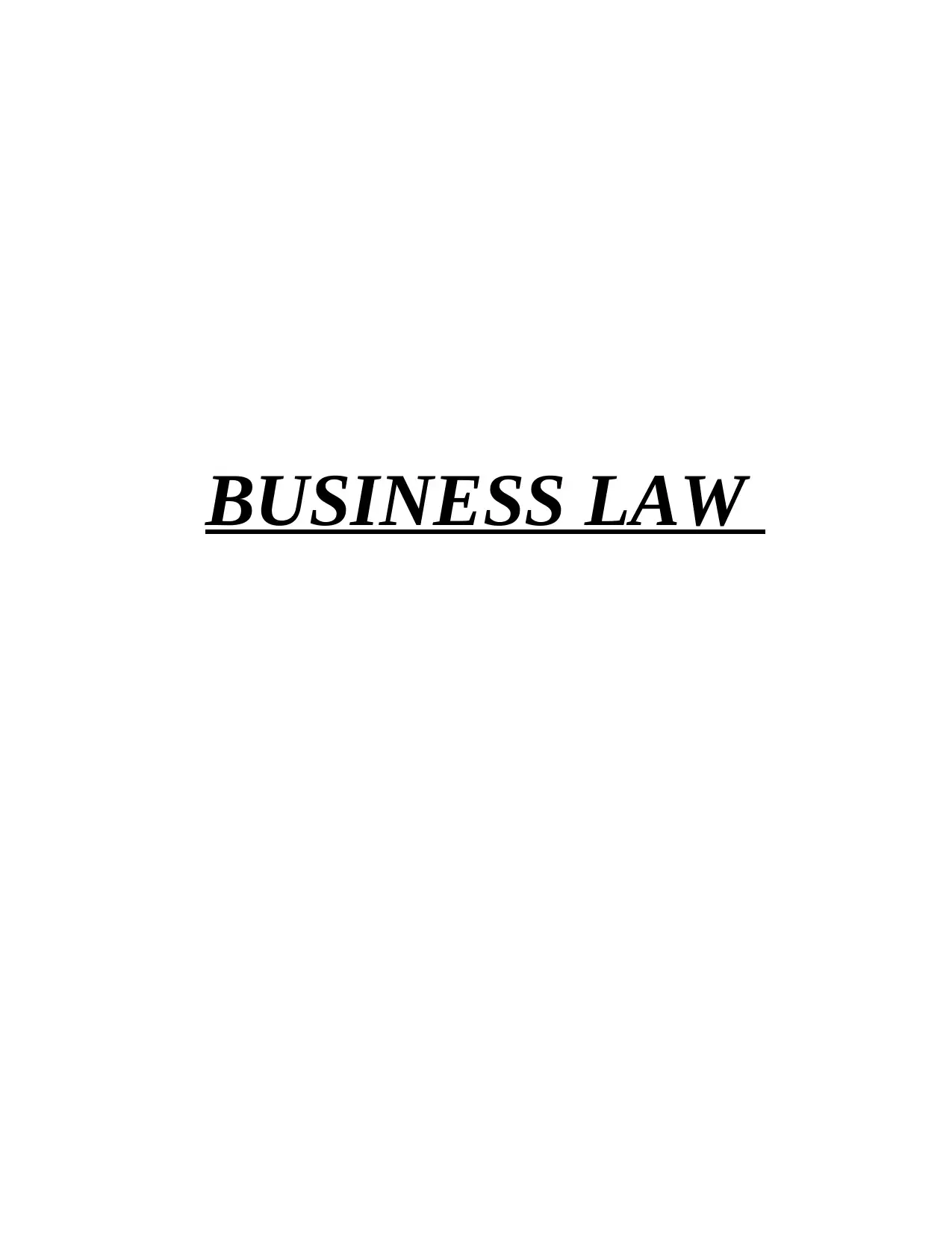
BUSINESS LAW
Paraphrase This Document
Need a fresh take? Get an instant paraphrase of this document with our AI Paraphraser

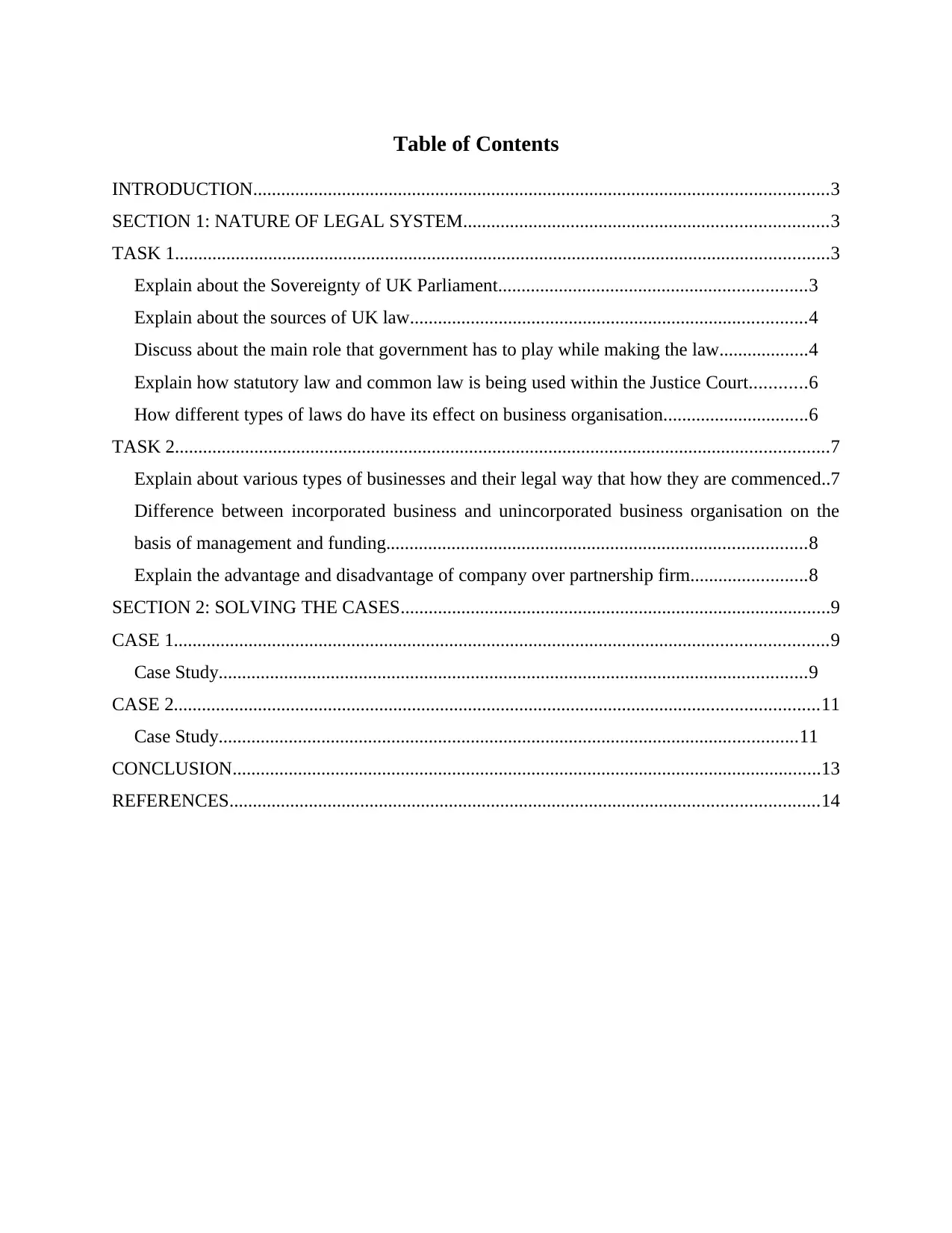
Table of Contents
INTRODUCTION...........................................................................................................................3
SECTION 1: NATURE OF LEGAL SYSTEM..............................................................................3
TASK 1............................................................................................................................................3
Explain about the Sovereignty of UK Parliament..................................................................3
Explain about the sources of UK law.....................................................................................4
Discuss about the main role that government has to play while making the law...................4
Explain how statutory law and common law is being used within the Justice Court............6
How different types of laws do have its effect on business organisation...............................6
TASK 2............................................................................................................................................7
Explain about various types of businesses and their legal way that how they are commenced..7
Difference between incorporated business and unincorporated business organisation on the
basis of management and funding..........................................................................................8
Explain the advantage and disadvantage of company over partnership firm.........................8
SECTION 2: SOLVING THE CASES............................................................................................9
CASE 1............................................................................................................................................9
Case Study..............................................................................................................................9
CASE 2..........................................................................................................................................11
Case Study............................................................................................................................11
CONCLUSION..............................................................................................................................13
REFERENCES..............................................................................................................................14
INTRODUCTION...........................................................................................................................3
SECTION 1: NATURE OF LEGAL SYSTEM..............................................................................3
TASK 1............................................................................................................................................3
Explain about the Sovereignty of UK Parliament..................................................................3
Explain about the sources of UK law.....................................................................................4
Discuss about the main role that government has to play while making the law...................4
Explain how statutory law and common law is being used within the Justice Court............6
How different types of laws do have its effect on business organisation...............................6
TASK 2............................................................................................................................................7
Explain about various types of businesses and their legal way that how they are commenced..7
Difference between incorporated business and unincorporated business organisation on the
basis of management and funding..........................................................................................8
Explain the advantage and disadvantage of company over partnership firm.........................8
SECTION 2: SOLVING THE CASES............................................................................................9
CASE 1............................................................................................................................................9
Case Study..............................................................................................................................9
CASE 2..........................................................................................................................................11
Case Study............................................................................................................................11
CONCLUSION..............................................................................................................................13
REFERENCES..............................................................................................................................14
⊘ This is a preview!⊘
Do you want full access?
Subscribe today to unlock all pages.

Trusted by 1+ million students worldwide
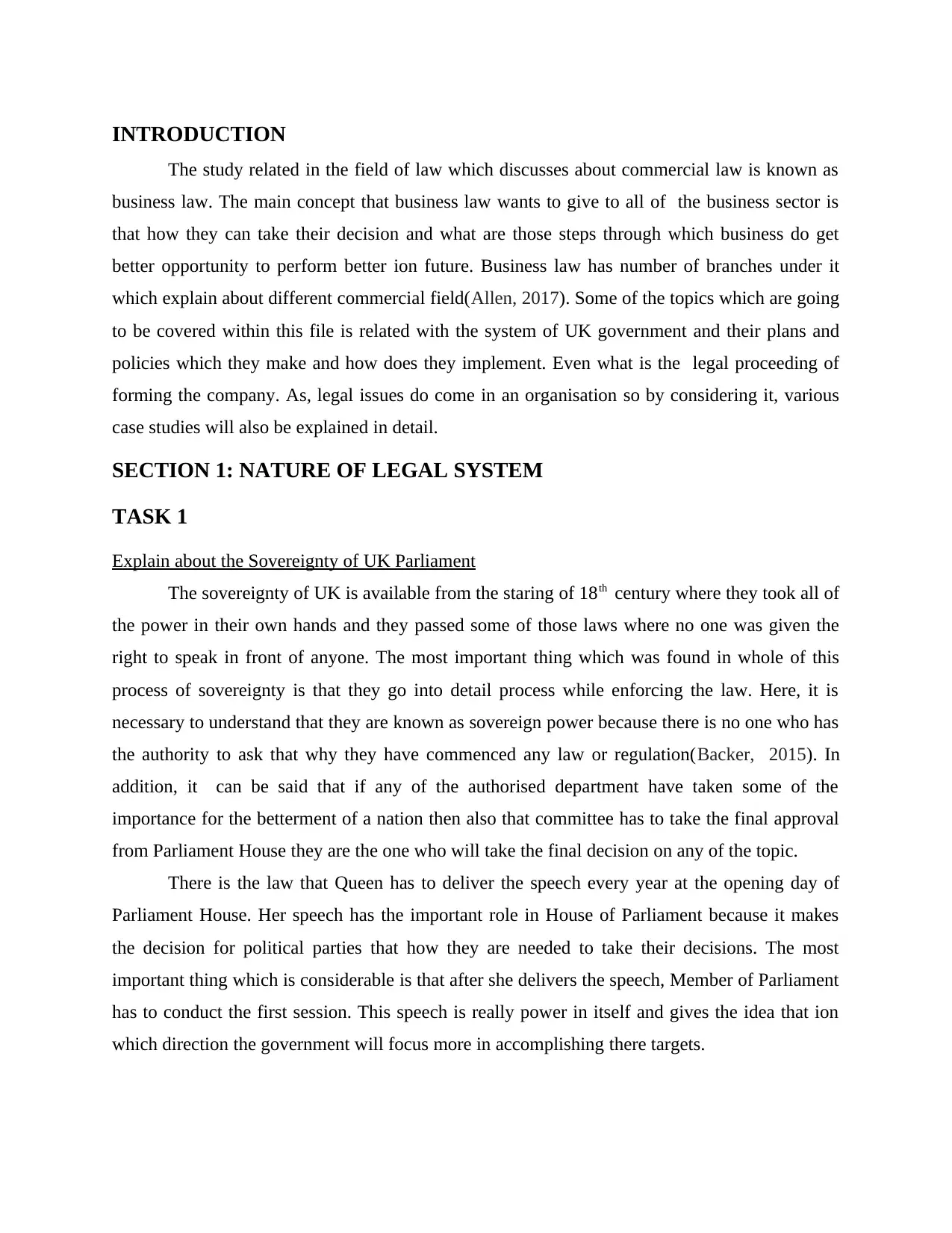
INTRODUCTION
The study related in the field of law which discusses about commercial law is known as
business law. The main concept that business law wants to give to all of the business sector is
that how they can take their decision and what are those steps through which business do get
better opportunity to perform better ion future. Business law has number of branches under it
which explain about different commercial field(Allen, 2017). Some of the topics which are going
to be covered within this file is related with the system of UK government and their plans and
policies which they make and how does they implement. Even what is the legal proceeding of
forming the company. As, legal issues do come in an organisation so by considering it, various
case studies will also be explained in detail.
SECTION 1: NATURE OF LEGAL SYSTEM
TASK 1
Explain about the Sovereignty of UK Parliament
The sovereignty of UK is available from the staring of 18th century where they took all of
the power in their own hands and they passed some of those laws where no one was given the
right to speak in front of anyone. The most important thing which was found in whole of this
process of sovereignty is that they go into detail process while enforcing the law. Here, it is
necessary to understand that they are known as sovereign power because there is no one who has
the authority to ask that why they have commenced any law or regulation(Backer, 2015). In
addition, it can be said that if any of the authorised department have taken some of the
importance for the betterment of a nation then also that committee has to take the final approval
from Parliament House they are the one who will take the final decision on any of the topic.
There is the law that Queen has to deliver the speech every year at the opening day of
Parliament House. Her speech has the important role in House of Parliament because it makes
the decision for political parties that how they are needed to take their decisions. The most
important thing which is considerable is that after she delivers the speech, Member of Parliament
has to conduct the first session. This speech is really power in itself and gives the idea that ion
which direction the government will focus more in accomplishing there targets.
The study related in the field of law which discusses about commercial law is known as
business law. The main concept that business law wants to give to all of the business sector is
that how they can take their decision and what are those steps through which business do get
better opportunity to perform better ion future. Business law has number of branches under it
which explain about different commercial field(Allen, 2017). Some of the topics which are going
to be covered within this file is related with the system of UK government and their plans and
policies which they make and how does they implement. Even what is the legal proceeding of
forming the company. As, legal issues do come in an organisation so by considering it, various
case studies will also be explained in detail.
SECTION 1: NATURE OF LEGAL SYSTEM
TASK 1
Explain about the Sovereignty of UK Parliament
The sovereignty of UK is available from the staring of 18th century where they took all of
the power in their own hands and they passed some of those laws where no one was given the
right to speak in front of anyone. The most important thing which was found in whole of this
process of sovereignty is that they go into detail process while enforcing the law. Here, it is
necessary to understand that they are known as sovereign power because there is no one who has
the authority to ask that why they have commenced any law or regulation(Backer, 2015). In
addition, it can be said that if any of the authorised department have taken some of the
importance for the betterment of a nation then also that committee has to take the final approval
from Parliament House they are the one who will take the final decision on any of the topic.
There is the law that Queen has to deliver the speech every year at the opening day of
Parliament House. Her speech has the important role in House of Parliament because it makes
the decision for political parties that how they are needed to take their decisions. The most
important thing which is considerable is that after she delivers the speech, Member of Parliament
has to conduct the first session. This speech is really power in itself and gives the idea that ion
which direction the government will focus more in accomplishing there targets.
Paraphrase This Document
Need a fresh take? Get an instant paraphrase of this document with our AI Paraphraser
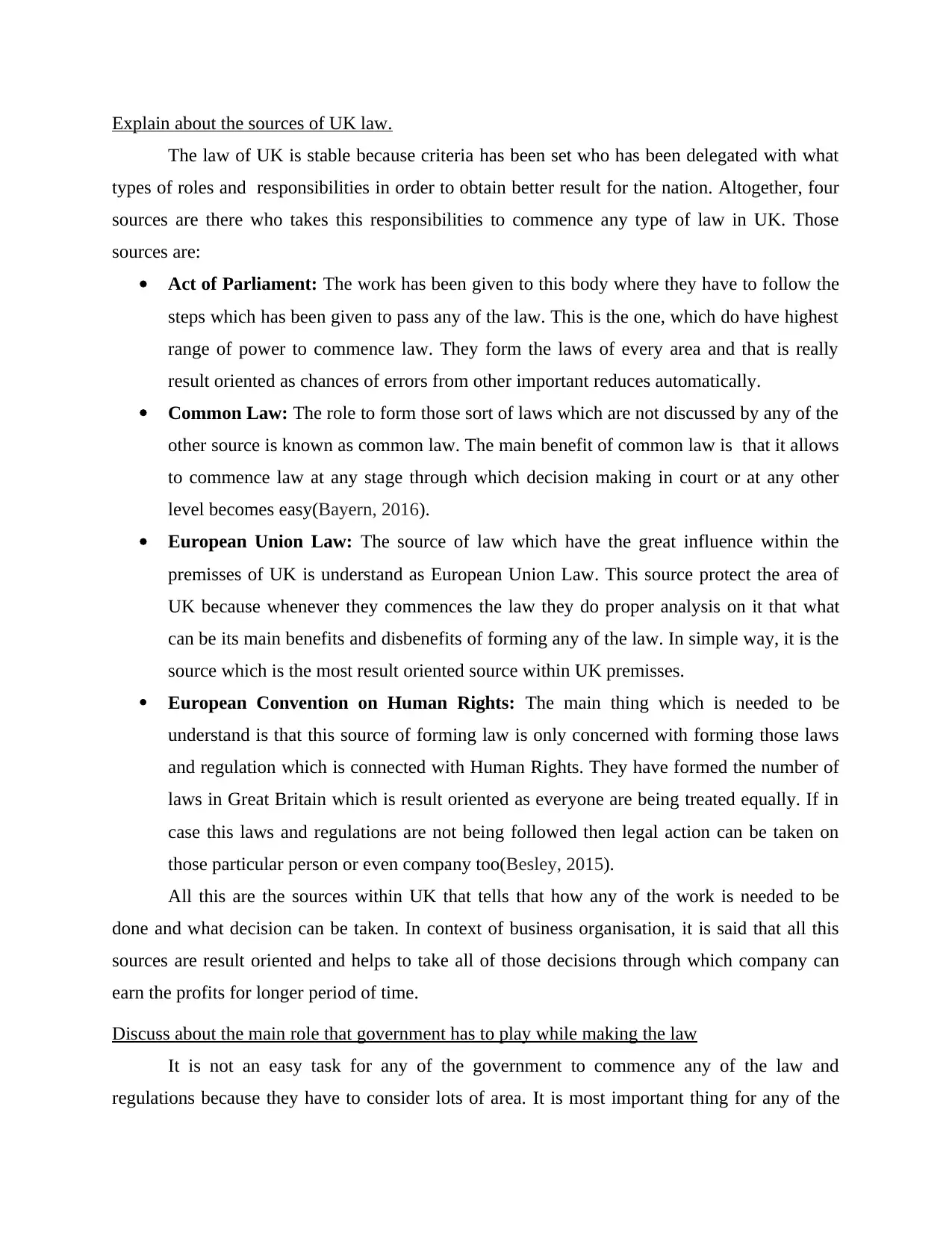
Explain about the sources of UK law.
The law of UK is stable because criteria has been set who has been delegated with what
types of roles and responsibilities in order to obtain better result for the nation. Altogether, four
sources are there who takes this responsibilities to commence any type of law in UK. Those
sources are:
Act of Parliament: The work has been given to this body where they have to follow the
steps which has been given to pass any of the law. This is the one, which do have highest
range of power to commence law. They form the laws of every area and that is really
result oriented as chances of errors from other important reduces automatically.
Common Law: The role to form those sort of laws which are not discussed by any of the
other source is known as common law. The main benefit of common law is that it allows
to commence law at any stage through which decision making in court or at any other
level becomes easy(Bayern, 2016).
European Union Law: The source of law which have the great influence within the
premisses of UK is understand as European Union Law. This source protect the area of
UK because whenever they commences the law they do proper analysis on it that what
can be its main benefits and disbenefits of forming any of the law. In simple way, it is the
source which is the most result oriented source within UK premisses.
European Convention on Human Rights: The main thing which is needed to be
understand is that this source of forming law is only concerned with forming those laws
and regulation which is connected with Human Rights. They have formed the number of
laws in Great Britain which is result oriented as everyone are being treated equally. If in
case this laws and regulations are not being followed then legal action can be taken on
those particular person or even company too(Besley, 2015).
All this are the sources within UK that tells that how any of the work is needed to be
done and what decision can be taken. In context of business organisation, it is said that all this
sources are result oriented and helps to take all of those decisions through which company can
earn the profits for longer period of time.
Discuss about the main role that government has to play while making the law
It is not an easy task for any of the government to commence any of the law and
regulations because they have to consider lots of area. It is most important thing for any of the
The law of UK is stable because criteria has been set who has been delegated with what
types of roles and responsibilities in order to obtain better result for the nation. Altogether, four
sources are there who takes this responsibilities to commence any type of law in UK. Those
sources are:
Act of Parliament: The work has been given to this body where they have to follow the
steps which has been given to pass any of the law. This is the one, which do have highest
range of power to commence law. They form the laws of every area and that is really
result oriented as chances of errors from other important reduces automatically.
Common Law: The role to form those sort of laws which are not discussed by any of the
other source is known as common law. The main benefit of common law is that it allows
to commence law at any stage through which decision making in court or at any other
level becomes easy(Bayern, 2016).
European Union Law: The source of law which have the great influence within the
premisses of UK is understand as European Union Law. This source protect the area of
UK because whenever they commences the law they do proper analysis on it that what
can be its main benefits and disbenefits of forming any of the law. In simple way, it is the
source which is the most result oriented source within UK premisses.
European Convention on Human Rights: The main thing which is needed to be
understand is that this source of forming law is only concerned with forming those laws
and regulation which is connected with Human Rights. They have formed the number of
laws in Great Britain which is result oriented as everyone are being treated equally. If in
case this laws and regulations are not being followed then legal action can be taken on
those particular person or even company too(Besley, 2015).
All this are the sources within UK that tells that how any of the work is needed to be
done and what decision can be taken. In context of business organisation, it is said that all this
sources are result oriented and helps to take all of those decisions through which company can
earn the profits for longer period of time.
Discuss about the main role that government has to play while making the law
It is not an easy task for any of the government to commence any of the law and
regulations because they have to consider lots of area. It is most important thing for any of the
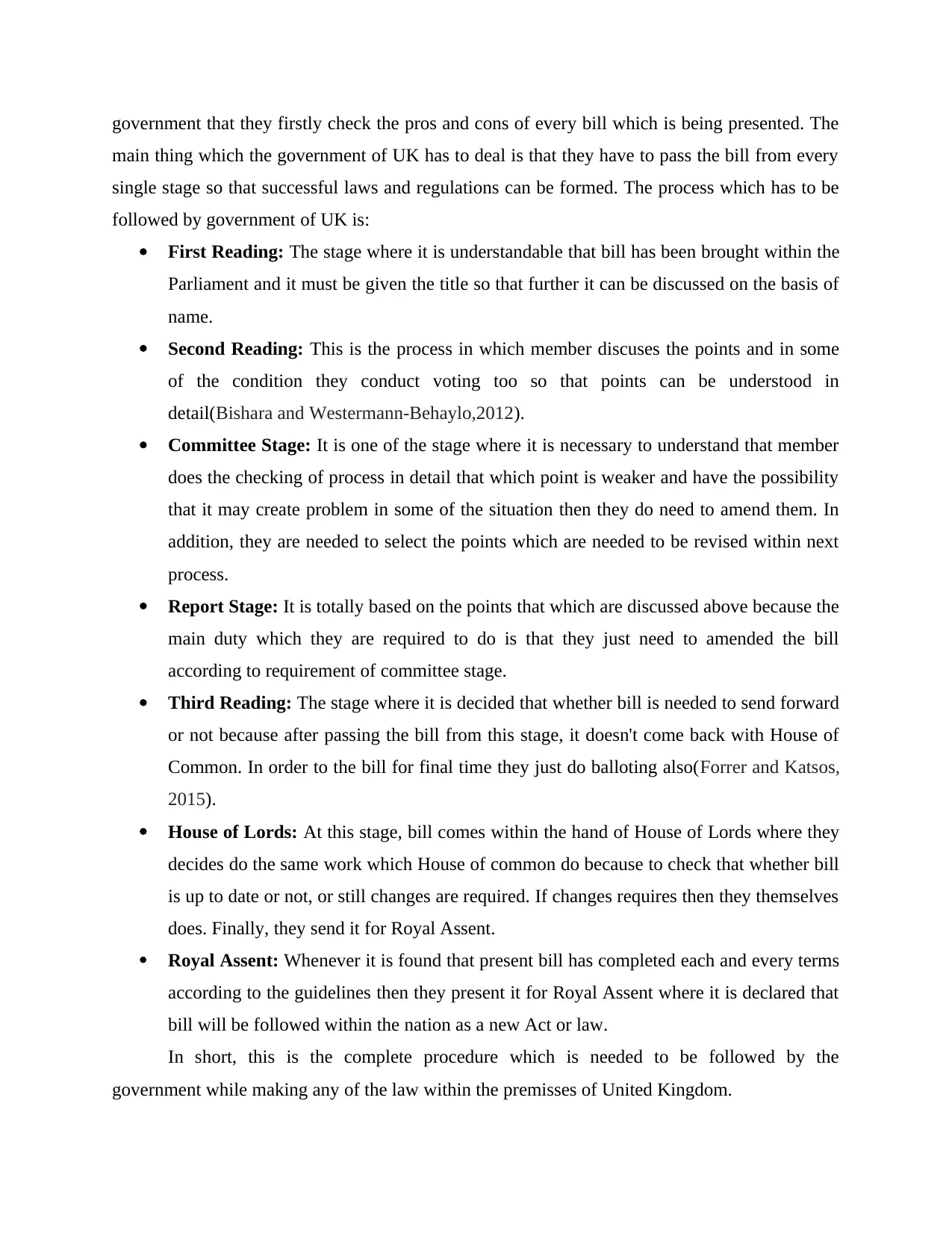
government that they firstly check the pros and cons of every bill which is being presented. The
main thing which the government of UK has to deal is that they have to pass the bill from every
single stage so that successful laws and regulations can be formed. The process which has to be
followed by government of UK is:
First Reading: The stage where it is understandable that bill has been brought within the
Parliament and it must be given the title so that further it can be discussed on the basis of
name.
Second Reading: This is the process in which member discuses the points and in some
of the condition they conduct voting too so that points can be understood in
detail(Bishara and Westermann‐Behaylo,2012).
Committee Stage: It is one of the stage where it is necessary to understand that member
does the checking of process in detail that which point is weaker and have the possibility
that it may create problem in some of the situation then they do need to amend them. In
addition, they are needed to select the points which are needed to be revised within next
process.
Report Stage: It is totally based on the points that which are discussed above because the
main duty which they are required to do is that they just need to amended the bill
according to requirement of committee stage.
Third Reading: The stage where it is decided that whether bill is needed to send forward
or not because after passing the bill from this stage, it doesn't come back with House of
Common. In order to the bill for final time they just do balloting also(Forrer and Katsos,
2015).
House of Lords: At this stage, bill comes within the hand of House of Lords where they
decides do the same work which House of common do because to check that whether bill
is up to date or not, or still changes are required. If changes requires then they themselves
does. Finally, they send it for Royal Assent.
Royal Assent: Whenever it is found that present bill has completed each and every terms
according to the guidelines then they present it for Royal Assent where it is declared that
bill will be followed within the nation as a new Act or law.
In short, this is the complete procedure which is needed to be followed by the
government while making any of the law within the premisses of United Kingdom.
main thing which the government of UK has to deal is that they have to pass the bill from every
single stage so that successful laws and regulations can be formed. The process which has to be
followed by government of UK is:
First Reading: The stage where it is understandable that bill has been brought within the
Parliament and it must be given the title so that further it can be discussed on the basis of
name.
Second Reading: This is the process in which member discuses the points and in some
of the condition they conduct voting too so that points can be understood in
detail(Bishara and Westermann‐Behaylo,2012).
Committee Stage: It is one of the stage where it is necessary to understand that member
does the checking of process in detail that which point is weaker and have the possibility
that it may create problem in some of the situation then they do need to amend them. In
addition, they are needed to select the points which are needed to be revised within next
process.
Report Stage: It is totally based on the points that which are discussed above because the
main duty which they are required to do is that they just need to amended the bill
according to requirement of committee stage.
Third Reading: The stage where it is decided that whether bill is needed to send forward
or not because after passing the bill from this stage, it doesn't come back with House of
Common. In order to the bill for final time they just do balloting also(Forrer and Katsos,
2015).
House of Lords: At this stage, bill comes within the hand of House of Lords where they
decides do the same work which House of common do because to check that whether bill
is up to date or not, or still changes are required. If changes requires then they themselves
does. Finally, they send it for Royal Assent.
Royal Assent: Whenever it is found that present bill has completed each and every terms
according to the guidelines then they present it for Royal Assent where it is declared that
bill will be followed within the nation as a new Act or law.
In short, this is the complete procedure which is needed to be followed by the
government while making any of the law within the premisses of United Kingdom.
⊘ This is a preview!⊘
Do you want full access?
Subscribe today to unlock all pages.

Trusted by 1+ million students worldwide
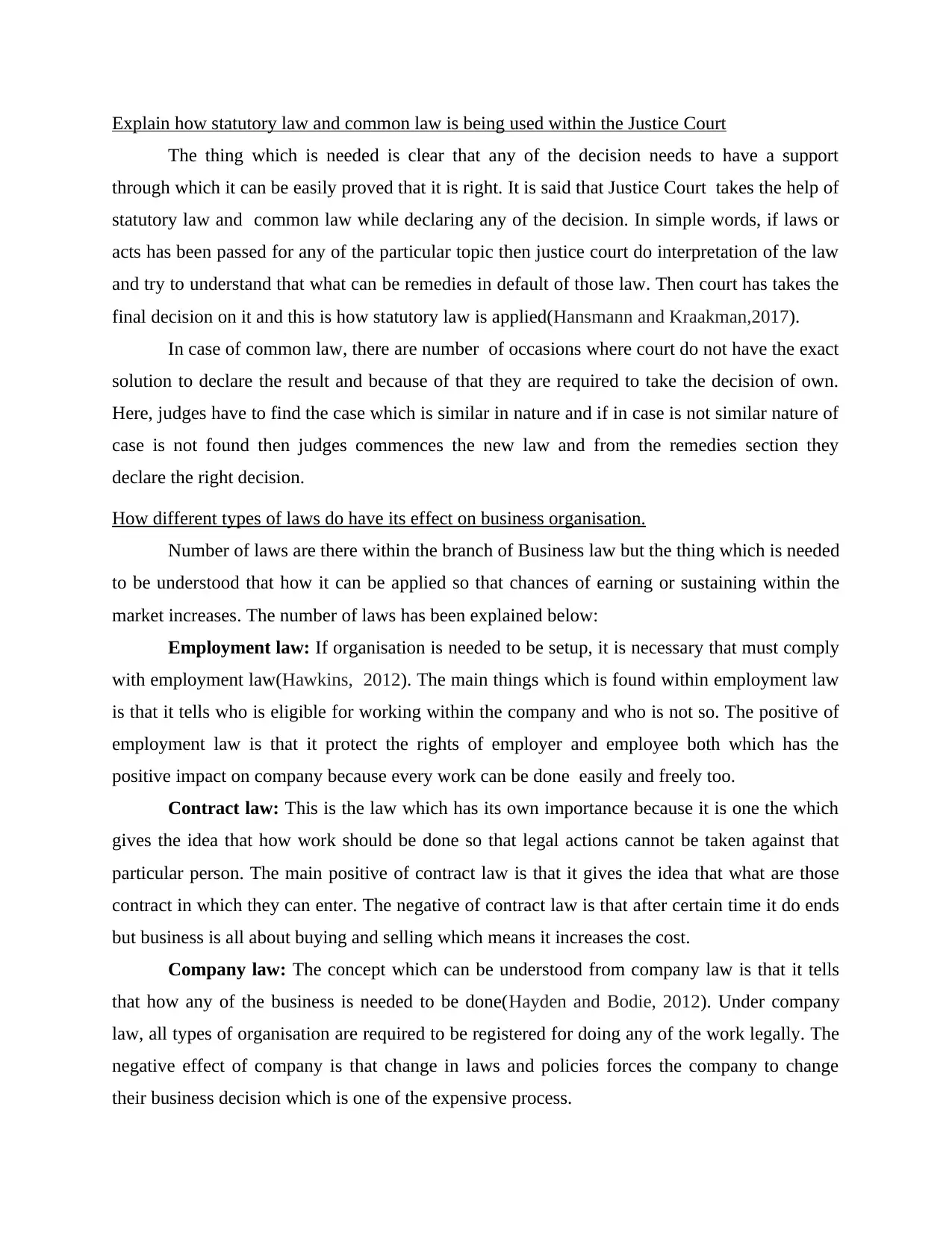
Explain how statutory law and common law is being used within the Justice Court
The thing which is needed is clear that any of the decision needs to have a support
through which it can be easily proved that it is right. It is said that Justice Court takes the help of
statutory law and common law while declaring any of the decision. In simple words, if laws or
acts has been passed for any of the particular topic then justice court do interpretation of the law
and try to understand that what can be remedies in default of those law. Then court has takes the
final decision on it and this is how statutory law is applied(Hansmann and Kraakman,2017).
In case of common law, there are number of occasions where court do not have the exact
solution to declare the result and because of that they are required to take the decision of own.
Here, judges have to find the case which is similar in nature and if in case is not similar nature of
case is not found then judges commences the new law and from the remedies section they
declare the right decision.
How different types of laws do have its effect on business organisation.
Number of laws are there within the branch of Business law but the thing which is needed
to be understood that how it can be applied so that chances of earning or sustaining within the
market increases. The number of laws has been explained below:
Employment law: If organisation is needed to be setup, it is necessary that must comply
with employment law(Hawkins, 2012). The main things which is found within employment law
is that it tells who is eligible for working within the company and who is not so. The positive of
employment law is that it protect the rights of employer and employee both which has the
positive impact on company because every work can be done easily and freely too.
Contract law: This is the law which has its own importance because it is one the which
gives the idea that how work should be done so that legal actions cannot be taken against that
particular person. The main positive of contract law is that it gives the idea that what are those
contract in which they can enter. The negative of contract law is that after certain time it do ends
but business is all about buying and selling which means it increases the cost.
Company law: The concept which can be understood from company law is that it tells
that how any of the business is needed to be done(Hayden and Bodie, 2012). Under company
law, all types of organisation are required to be registered for doing any of the work legally. The
negative effect of company is that change in laws and policies forces the company to change
their business decision which is one of the expensive process.
The thing which is needed is clear that any of the decision needs to have a support
through which it can be easily proved that it is right. It is said that Justice Court takes the help of
statutory law and common law while declaring any of the decision. In simple words, if laws or
acts has been passed for any of the particular topic then justice court do interpretation of the law
and try to understand that what can be remedies in default of those law. Then court has takes the
final decision on it and this is how statutory law is applied(Hansmann and Kraakman,2017).
In case of common law, there are number of occasions where court do not have the exact
solution to declare the result and because of that they are required to take the decision of own.
Here, judges have to find the case which is similar in nature and if in case is not similar nature of
case is not found then judges commences the new law and from the remedies section they
declare the right decision.
How different types of laws do have its effect on business organisation.
Number of laws are there within the branch of Business law but the thing which is needed
to be understood that how it can be applied so that chances of earning or sustaining within the
market increases. The number of laws has been explained below:
Employment law: If organisation is needed to be setup, it is necessary that must comply
with employment law(Hawkins, 2012). The main things which is found within employment law
is that it tells who is eligible for working within the company and who is not so. The positive of
employment law is that it protect the rights of employer and employee both which has the
positive impact on company because every work can be done easily and freely too.
Contract law: This is the law which has its own importance because it is one the which
gives the idea that how work should be done so that legal actions cannot be taken against that
particular person. The main positive of contract law is that it gives the idea that what are those
contract in which they can enter. The negative of contract law is that after certain time it do ends
but business is all about buying and selling which means it increases the cost.
Company law: The concept which can be understood from company law is that it tells
that how any of the business is needed to be done(Hayden and Bodie, 2012). Under company
law, all types of organisation are required to be registered for doing any of the work legally. The
negative effect of company is that change in laws and policies forces the company to change
their business decision which is one of the expensive process.
Paraphrase This Document
Need a fresh take? Get an instant paraphrase of this document with our AI Paraphraser
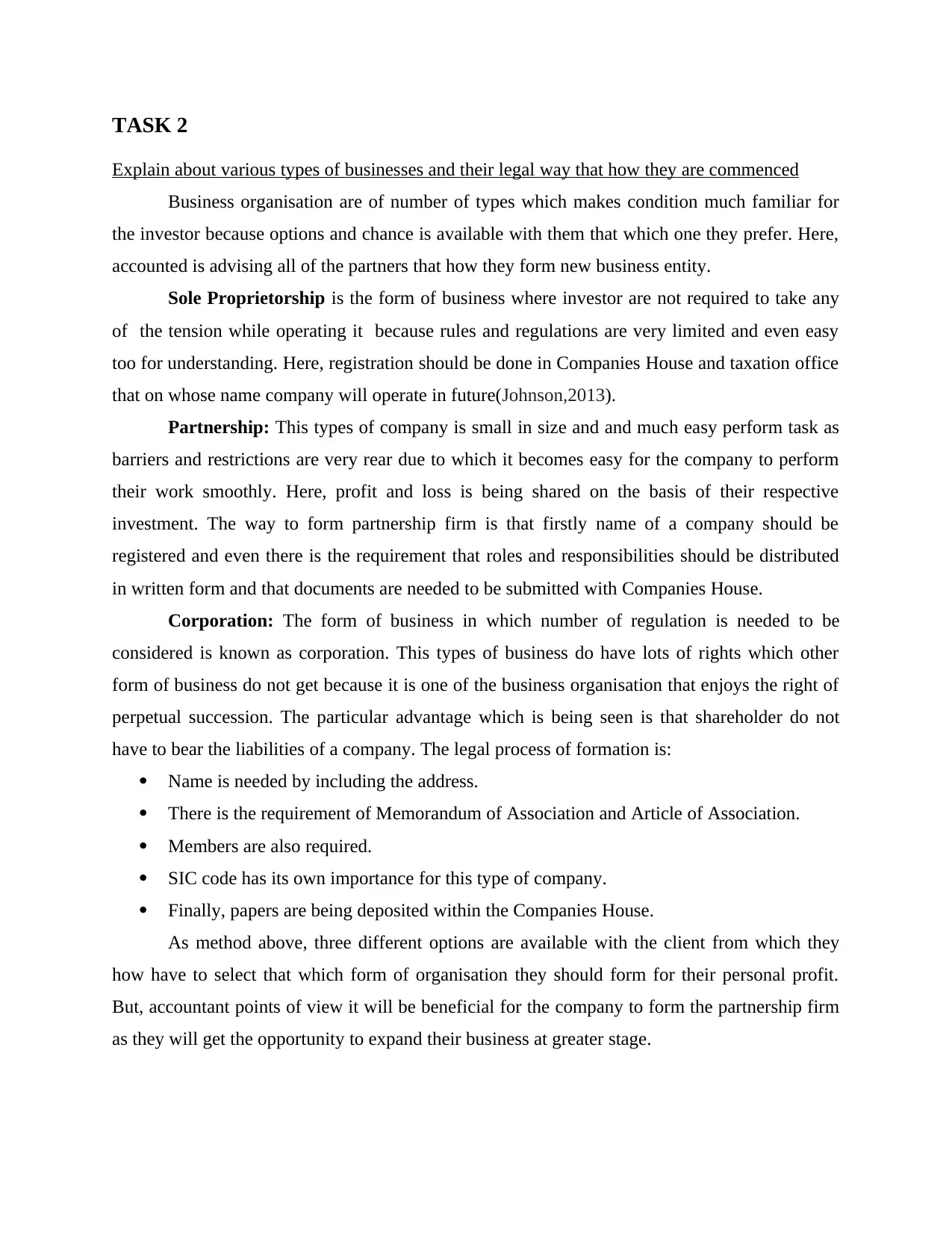
TASK 2
Explain about various types of businesses and their legal way that how they are commenced
Business organisation are of number of types which makes condition much familiar for
the investor because options and chance is available with them that which one they prefer. Here,
accounted is advising all of the partners that how they form new business entity.
Sole Proprietorship is the form of business where investor are not required to take any
of the tension while operating it because rules and regulations are very limited and even easy
too for understanding. Here, registration should be done in Companies House and taxation office
that on whose name company will operate in future(Johnson,2013).
Partnership: This types of company is small in size and and much easy perform task as
barriers and restrictions are very rear due to which it becomes easy for the company to perform
their work smoothly. Here, profit and loss is being shared on the basis of their respective
investment. The way to form partnership firm is that firstly name of a company should be
registered and even there is the requirement that roles and responsibilities should be distributed
in written form and that documents are needed to be submitted with Companies House.
Corporation: The form of business in which number of regulation is needed to be
considered is known as corporation. This types of business do have lots of rights which other
form of business do not get because it is one of the business organisation that enjoys the right of
perpetual succession. The particular advantage which is being seen is that shareholder do not
have to bear the liabilities of a company. The legal process of formation is:
Name is needed by including the address.
There is the requirement of Memorandum of Association and Article of Association.
Members are also required.
SIC code has its own importance for this type of company.
Finally, papers are being deposited within the Companies House.
As method above, three different options are available with the client from which they
how have to select that which form of organisation they should form for their personal profit.
But, accountant points of view it will be beneficial for the company to form the partnership firm
as they will get the opportunity to expand their business at greater stage.
Explain about various types of businesses and their legal way that how they are commenced
Business organisation are of number of types which makes condition much familiar for
the investor because options and chance is available with them that which one they prefer. Here,
accounted is advising all of the partners that how they form new business entity.
Sole Proprietorship is the form of business where investor are not required to take any
of the tension while operating it because rules and regulations are very limited and even easy
too for understanding. Here, registration should be done in Companies House and taxation office
that on whose name company will operate in future(Johnson,2013).
Partnership: This types of company is small in size and and much easy perform task as
barriers and restrictions are very rear due to which it becomes easy for the company to perform
their work smoothly. Here, profit and loss is being shared on the basis of their respective
investment. The way to form partnership firm is that firstly name of a company should be
registered and even there is the requirement that roles and responsibilities should be distributed
in written form and that documents are needed to be submitted with Companies House.
Corporation: The form of business in which number of regulation is needed to be
considered is known as corporation. This types of business do have lots of rights which other
form of business do not get because it is one of the business organisation that enjoys the right of
perpetual succession. The particular advantage which is being seen is that shareholder do not
have to bear the liabilities of a company. The legal process of formation is:
Name is needed by including the address.
There is the requirement of Memorandum of Association and Article of Association.
Members are also required.
SIC code has its own importance for this type of company.
Finally, papers are being deposited within the Companies House.
As method above, three different options are available with the client from which they
how have to select that which form of organisation they should form for their personal profit.
But, accountant points of view it will be beneficial for the company to form the partnership firm
as they will get the opportunity to expand their business at greater stage.
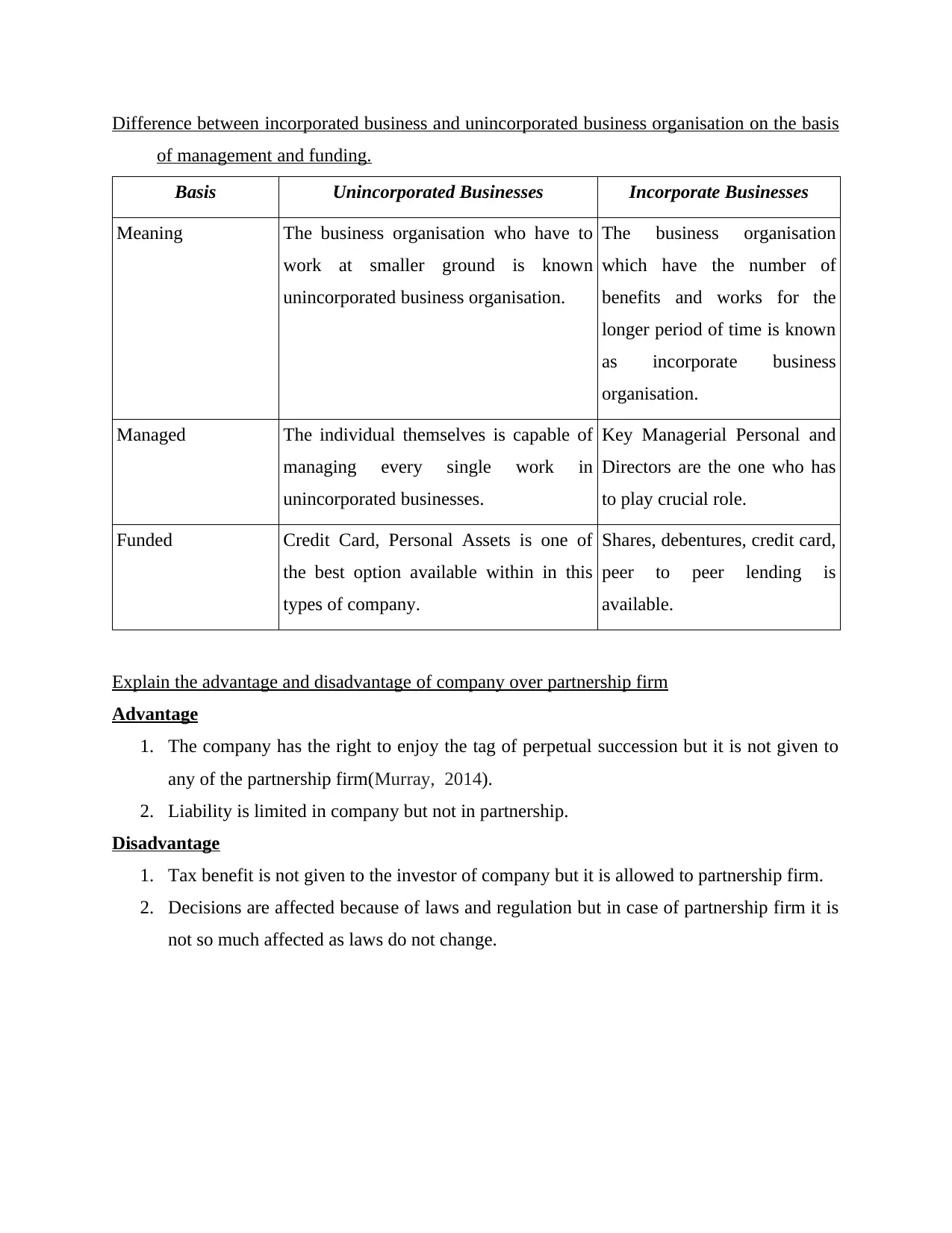
Difference between incorporated business and unincorporated business organisation on the basis
of management and funding.
Basis Unincorporated Businesses Incorporate Businesses
Meaning The business organisation who have to
work at smaller ground is known
unincorporated business organisation.
The business organisation
which have the number of
benefits and works for the
longer period of time is known
as incorporate business
organisation.
Managed The individual themselves is capable of
managing every single work in
unincorporated businesses.
Key Managerial Personal and
Directors are the one who has
to play crucial role.
Funded Credit Card, Personal Assets is one of
the best option available within in this
types of company.
Shares, debentures, credit card,
peer to peer lending is
available.
Explain the advantage and disadvantage of company over partnership firm
Advantage
1. The company has the right to enjoy the tag of perpetual succession but it is not given to
any of the partnership firm(Murray, 2014).
2. Liability is limited in company but not in partnership.
Disadvantage
1. Tax benefit is not given to the investor of company but it is allowed to partnership firm.
2. Decisions are affected because of laws and regulation but in case of partnership firm it is
not so much affected as laws do not change.
of management and funding.
Basis Unincorporated Businesses Incorporate Businesses
Meaning The business organisation who have to
work at smaller ground is known
unincorporated business organisation.
The business organisation
which have the number of
benefits and works for the
longer period of time is known
as incorporate business
organisation.
Managed The individual themselves is capable of
managing every single work in
unincorporated businesses.
Key Managerial Personal and
Directors are the one who has
to play crucial role.
Funded Credit Card, Personal Assets is one of
the best option available within in this
types of company.
Shares, debentures, credit card,
peer to peer lending is
available.
Explain the advantage and disadvantage of company over partnership firm
Advantage
1. The company has the right to enjoy the tag of perpetual succession but it is not given to
any of the partnership firm(Murray, 2014).
2. Liability is limited in company but not in partnership.
Disadvantage
1. Tax benefit is not given to the investor of company but it is allowed to partnership firm.
2. Decisions are affected because of laws and regulation but in case of partnership firm it is
not so much affected as laws do not change.
⊘ This is a preview!⊘
Do you want full access?
Subscribe today to unlock all pages.

Trusted by 1+ million students worldwide
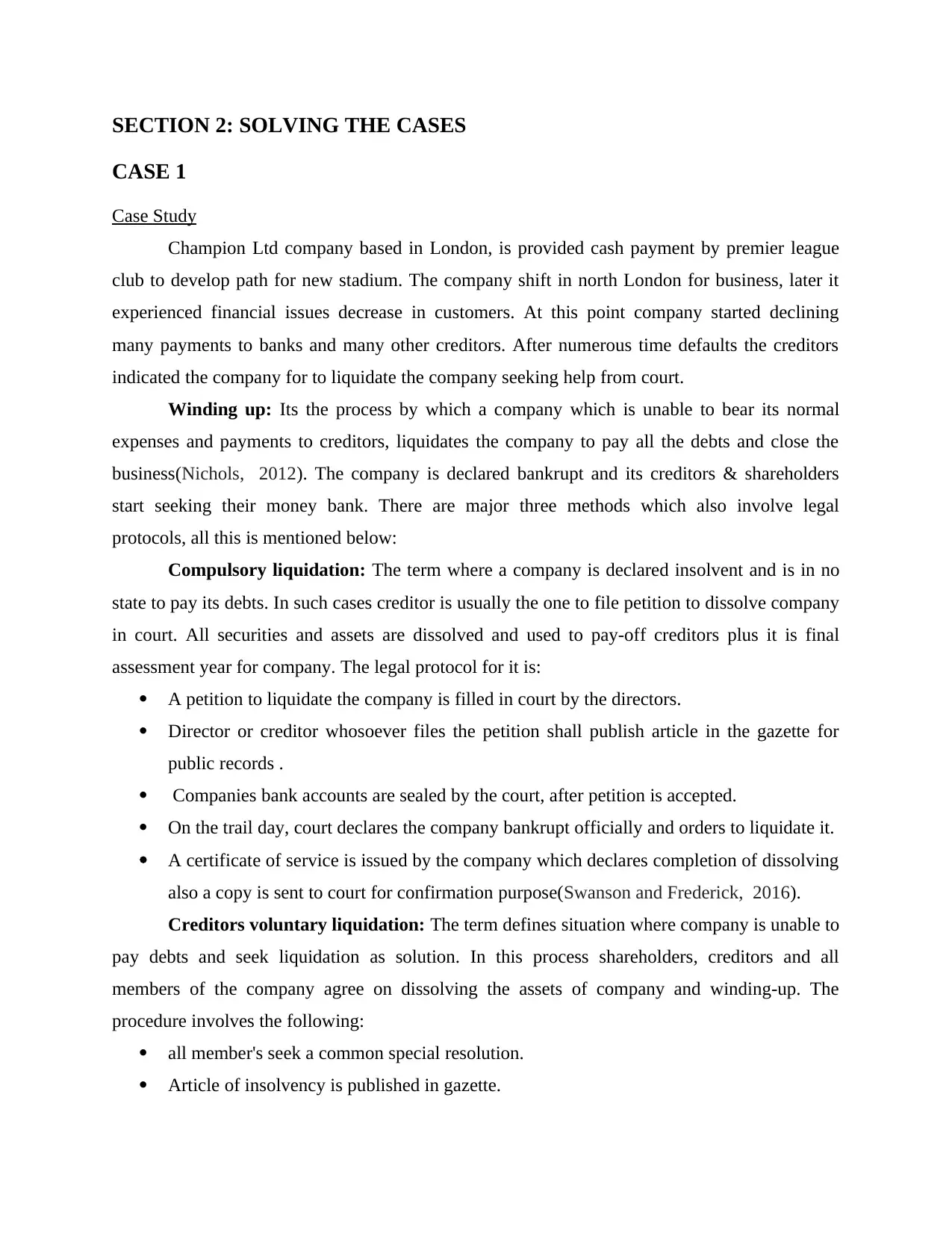
SECTION 2: SOLVING THE CASES
CASE 1
Case Study
Champion Ltd company based in London, is provided cash payment by premier league
club to develop path for new stadium. The company shift in north London for business, later it
experienced financial issues decrease in customers. At this point company started declining
many payments to banks and many other creditors. After numerous time defaults the creditors
indicated the company for to liquidate the company seeking help from court.
Winding up: Its the process by which a company which is unable to bear its normal
expenses and payments to creditors, liquidates the company to pay all the debts and close the
business(Nichols, 2012). The company is declared bankrupt and its creditors & shareholders
start seeking their money bank. There are major three methods which also involve legal
protocols, all this is mentioned below:
Compulsory liquidation: The term where a company is declared insolvent and is in no
state to pay its debts. In such cases creditor is usually the one to file petition to dissolve company
in court. All securities and assets are dissolved and used to pay-off creditors plus it is final
assessment year for company. The legal protocol for it is:
A petition to liquidate the company is filled in court by the directors.
Director or creditor whosoever files the petition shall publish article in the gazette for
public records .
Companies bank accounts are sealed by the court, after petition is accepted.
On the trail day, court declares the company bankrupt officially and orders to liquidate it.
A certificate of service is issued by the company which declares completion of dissolving
also a copy is sent to court for confirmation purpose(Swanson and Frederick, 2016).
Creditors voluntary liquidation: The term defines situation where company is unable to
pay debts and seek liquidation as solution. In this process shareholders, creditors and all
members of the company agree on dissolving the assets of company and winding-up. The
procedure involves the following:
all member's seek a common special resolution.
Article of insolvency is published in gazette.
CASE 1
Case Study
Champion Ltd company based in London, is provided cash payment by premier league
club to develop path for new stadium. The company shift in north London for business, later it
experienced financial issues decrease in customers. At this point company started declining
many payments to banks and many other creditors. After numerous time defaults the creditors
indicated the company for to liquidate the company seeking help from court.
Winding up: Its the process by which a company which is unable to bear its normal
expenses and payments to creditors, liquidates the company to pay all the debts and close the
business(Nichols, 2012). The company is declared bankrupt and its creditors & shareholders
start seeking their money bank. There are major three methods which also involve legal
protocols, all this is mentioned below:
Compulsory liquidation: The term where a company is declared insolvent and is in no
state to pay its debts. In such cases creditor is usually the one to file petition to dissolve company
in court. All securities and assets are dissolved and used to pay-off creditors plus it is final
assessment year for company. The legal protocol for it is:
A petition to liquidate the company is filled in court by the directors.
Director or creditor whosoever files the petition shall publish article in the gazette for
public records .
Companies bank accounts are sealed by the court, after petition is accepted.
On the trail day, court declares the company bankrupt officially and orders to liquidate it.
A certificate of service is issued by the company which declares completion of dissolving
also a copy is sent to court for confirmation purpose(Swanson and Frederick, 2016).
Creditors voluntary liquidation: The term defines situation where company is unable to
pay debts and seek liquidation as solution. In this process shareholders, creditors and all
members of the company agree on dissolving the assets of company and winding-up. The
procedure involves the following:
all member's seek a common special resolution.
Article of insolvency is published in gazette.
Paraphrase This Document
Need a fresh take? Get an instant paraphrase of this document with our AI Paraphraser
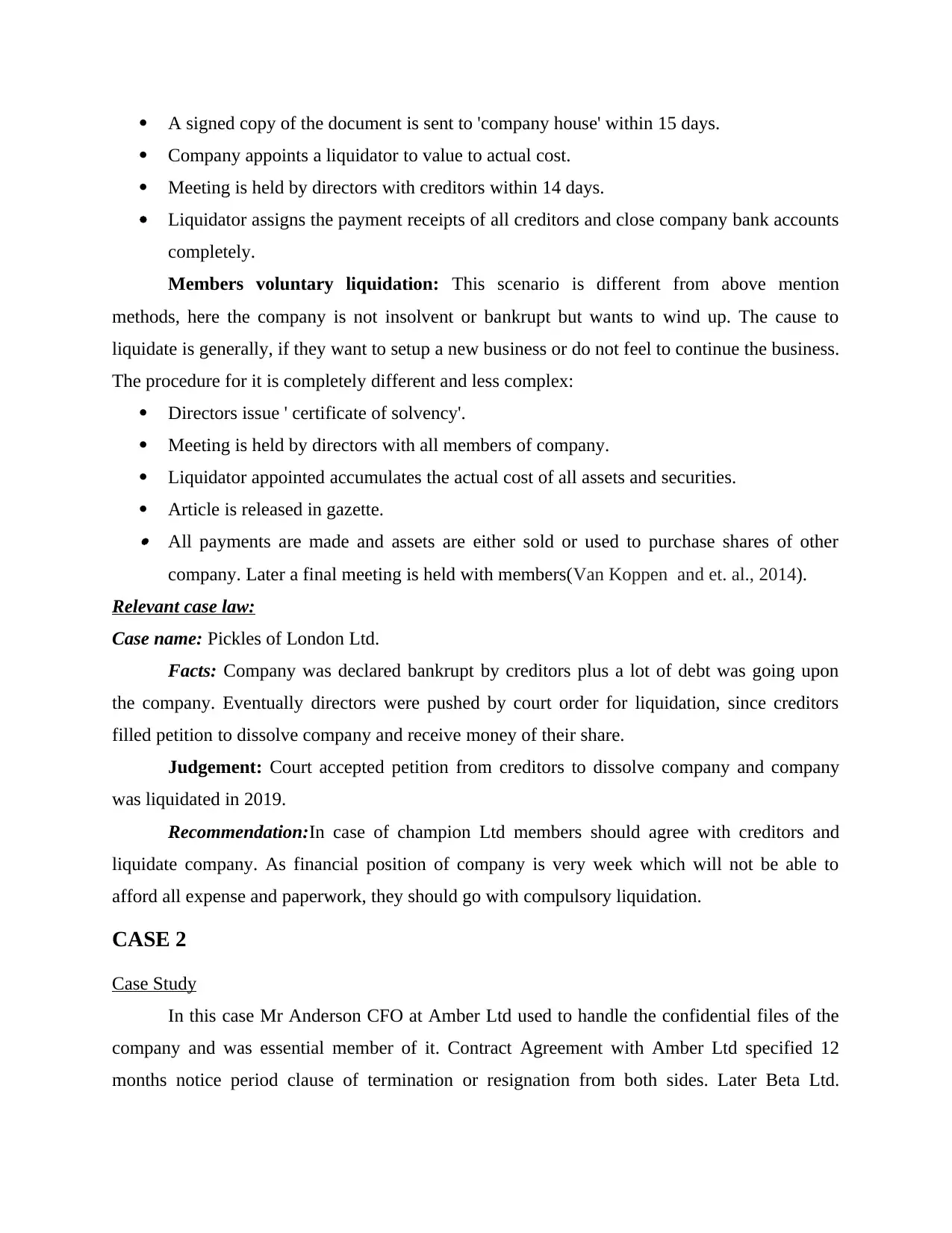
A signed copy of the document is sent to 'company house' within 15 days.
Company appoints a liquidator to value to actual cost.
Meeting is held by directors with creditors within 14 days.
Liquidator assigns the payment receipts of all creditors and close company bank accounts
completely.
Members voluntary liquidation: This scenario is different from above mention
methods, here the company is not insolvent or bankrupt but wants to wind up. The cause to
liquidate is generally, if they want to setup a new business or do not feel to continue the business.
The procedure for it is completely different and less complex:
Directors issue ' certificate of solvency'.
Meeting is held by directors with all members of company.
Liquidator appointed accumulates the actual cost of all assets and securities.
Article is released in gazette. All payments are made and assets are either sold or used to purchase shares of other
company. Later a final meeting is held with members(Van Koppen and et. al., 2014).
Relevant case law:
Case name: Pickles of London Ltd.
Facts: Company was declared bankrupt by creditors plus a lot of debt was going upon
the company. Eventually directors were pushed by court order for liquidation, since creditors
filled petition to dissolve company and receive money of their share.
Judgement: Court accepted petition from creditors to dissolve company and company
was liquidated in 2019.
Recommendation:In case of champion Ltd members should agree with creditors and
liquidate company. As financial position of company is very week which will not be able to
afford all expense and paperwork, they should go with compulsory liquidation.
CASE 2
Case Study
In this case Mr Anderson CFO at Amber Ltd used to handle the confidential files of the
company and was essential member of it. Contract Agreement with Amber Ltd specified 12
months notice period clause of termination or resignation from both sides. Later Beta Ltd.
Company appoints a liquidator to value to actual cost.
Meeting is held by directors with creditors within 14 days.
Liquidator assigns the payment receipts of all creditors and close company bank accounts
completely.
Members voluntary liquidation: This scenario is different from above mention
methods, here the company is not insolvent or bankrupt but wants to wind up. The cause to
liquidate is generally, if they want to setup a new business or do not feel to continue the business.
The procedure for it is completely different and less complex:
Directors issue ' certificate of solvency'.
Meeting is held by directors with all members of company.
Liquidator appointed accumulates the actual cost of all assets and securities.
Article is released in gazette. All payments are made and assets are either sold or used to purchase shares of other
company. Later a final meeting is held with members(Van Koppen and et. al., 2014).
Relevant case law:
Case name: Pickles of London Ltd.
Facts: Company was declared bankrupt by creditors plus a lot of debt was going upon
the company. Eventually directors were pushed by court order for liquidation, since creditors
filled petition to dissolve company and receive money of their share.
Judgement: Court accepted petition from creditors to dissolve company and company
was liquidated in 2019.
Recommendation:In case of champion Ltd members should agree with creditors and
liquidate company. As financial position of company is very week which will not be able to
afford all expense and paperwork, they should go with compulsory liquidation.
CASE 2
Case Study
In this case Mr Anderson CFO at Amber Ltd used to handle the confidential files of the
company and was essential member of it. Contract Agreement with Amber Ltd specified 12
months notice period clause of termination or resignation from both sides. Later Beta Ltd.
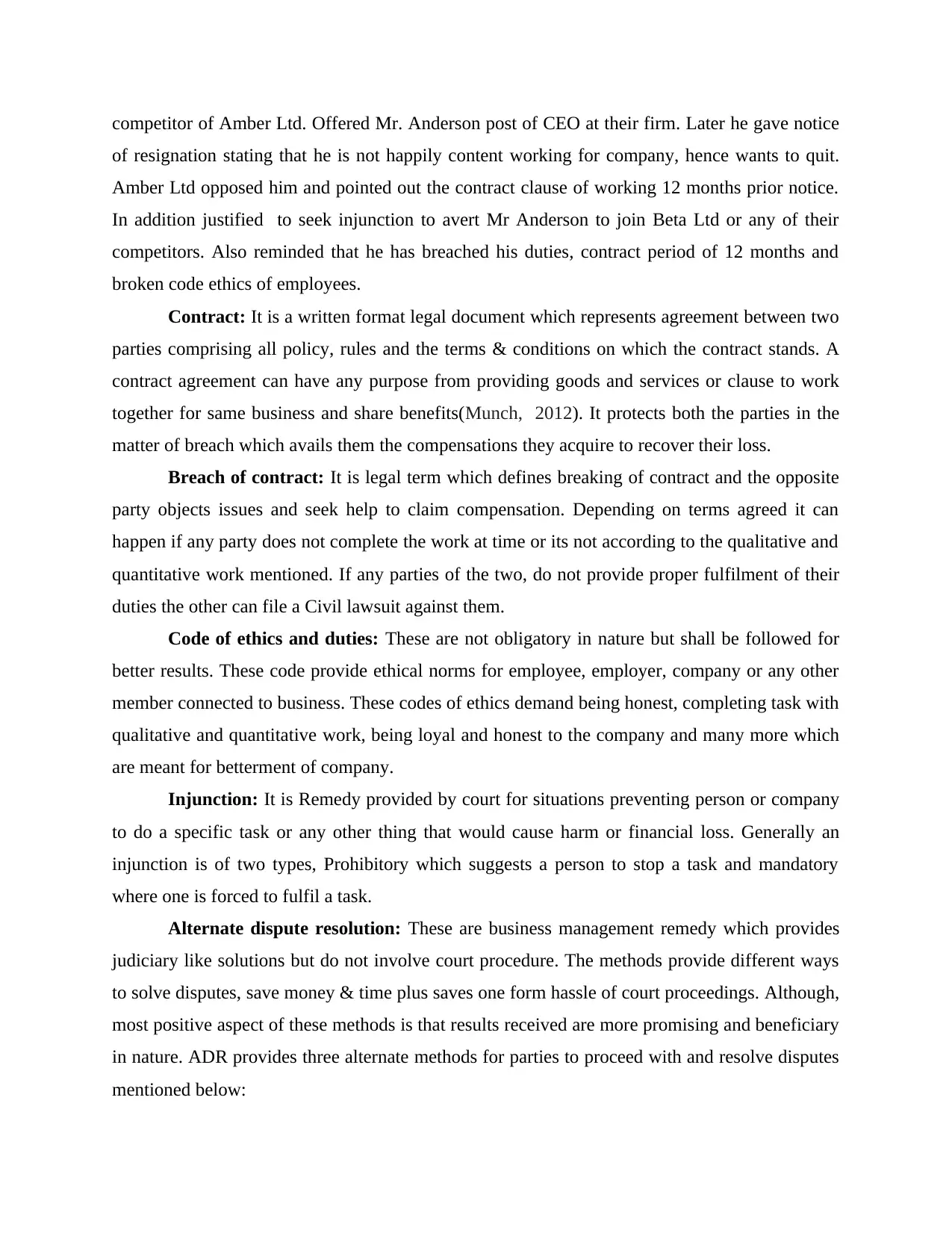
competitor of Amber Ltd. Offered Mr. Anderson post of CEO at their firm. Later he gave notice
of resignation stating that he is not happily content working for company, hence wants to quit.
Amber Ltd opposed him and pointed out the contract clause of working 12 months prior notice.
In addition justified to seek injunction to avert Mr Anderson to join Beta Ltd or any of their
competitors. Also reminded that he has breached his duties, contract period of 12 months and
broken code ethics of employees.
Contract: It is a written format legal document which represents agreement between two
parties comprising all policy, rules and the terms & conditions on which the contract stands. A
contract agreement can have any purpose from providing goods and services or clause to work
together for same business and share benefits(Munch, 2012). It protects both the parties in the
matter of breach which avails them the compensations they acquire to recover their loss.
Breach of contract: It is legal term which defines breaking of contract and the opposite
party objects issues and seek help to claim compensation. Depending on terms agreed it can
happen if any party does not complete the work at time or its not according to the qualitative and
quantitative work mentioned. If any parties of the two, do not provide proper fulfilment of their
duties the other can file a Civil lawsuit against them.
Code of ethics and duties: These are not obligatory in nature but shall be followed for
better results. These code provide ethical norms for employee, employer, company or any other
member connected to business. These codes of ethics demand being honest, completing task with
qualitative and quantitative work, being loyal and honest to the company and many more which
are meant for betterment of company.
Injunction: It is Remedy provided by court for situations preventing person or company
to do a specific task or any other thing that would cause harm or financial loss. Generally an
injunction is of two types, Prohibitory which suggests a person to stop a task and mandatory
where one is forced to fulfil a task.
Alternate dispute resolution: These are business management remedy which provides
judiciary like solutions but do not involve court procedure. The methods provide different ways
to solve disputes, save money & time plus saves one form hassle of court proceedings. Although,
most positive aspect of these methods is that results received are more promising and beneficiary
in nature. ADR provides three alternate methods for parties to proceed with and resolve disputes
mentioned below:
of resignation stating that he is not happily content working for company, hence wants to quit.
Amber Ltd opposed him and pointed out the contract clause of working 12 months prior notice.
In addition justified to seek injunction to avert Mr Anderson to join Beta Ltd or any of their
competitors. Also reminded that he has breached his duties, contract period of 12 months and
broken code ethics of employees.
Contract: It is a written format legal document which represents agreement between two
parties comprising all policy, rules and the terms & conditions on which the contract stands. A
contract agreement can have any purpose from providing goods and services or clause to work
together for same business and share benefits(Munch, 2012). It protects both the parties in the
matter of breach which avails them the compensations they acquire to recover their loss.
Breach of contract: It is legal term which defines breaking of contract and the opposite
party objects issues and seek help to claim compensation. Depending on terms agreed it can
happen if any party does not complete the work at time or its not according to the qualitative and
quantitative work mentioned. If any parties of the two, do not provide proper fulfilment of their
duties the other can file a Civil lawsuit against them.
Code of ethics and duties: These are not obligatory in nature but shall be followed for
better results. These code provide ethical norms for employee, employer, company or any other
member connected to business. These codes of ethics demand being honest, completing task with
qualitative and quantitative work, being loyal and honest to the company and many more which
are meant for betterment of company.
Injunction: It is Remedy provided by court for situations preventing person or company
to do a specific task or any other thing that would cause harm or financial loss. Generally an
injunction is of two types, Prohibitory which suggests a person to stop a task and mandatory
where one is forced to fulfil a task.
Alternate dispute resolution: These are business management remedy which provides
judiciary like solutions but do not involve court procedure. The methods provide different ways
to solve disputes, save money & time plus saves one form hassle of court proceedings. Although,
most positive aspect of these methods is that results received are more promising and beneficiary
in nature. ADR provides three alternate methods for parties to proceed with and resolve disputes
mentioned below:
⊘ This is a preview!⊘
Do you want full access?
Subscribe today to unlock all pages.

Trusted by 1+ million students worldwide
1 out of 15
Related Documents
Your All-in-One AI-Powered Toolkit for Academic Success.
+13062052269
info@desklib.com
Available 24*7 on WhatsApp / Email
![[object Object]](/_next/static/media/star-bottom.7253800d.svg)
Unlock your academic potential
Copyright © 2020–2026 A2Z Services. All Rights Reserved. Developed and managed by ZUCOL.





